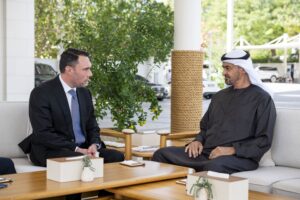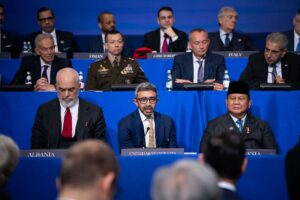“Islam and Human Fraternity” Conference Addresses Global Challenges and Interfaith Cooperation

Abu Dhabi, The Gulf Observer: The second day of the “Islam and Human Fraternity” conference, organized by Trends Research and Advisory in collaboration with the Ministry of Tolerance and Coexistence and the University Platform for the Study of Islam “PLURIEL,” delved into critical issues surrounding the Document on Human Fraternity. The sessions explored geopolitical challenges and their implications for minority rights, focusing on the theme “The Document on Human Fraternity: An Islamic Vision for Global Coexistence and the Protection of Human Dignity.”
Dr. Muhammad Al-Bashari, Secretary-General of the World Council of Muslim Communities, emphasized the document’s relevance to pressing global concerns. He underscored the necessity of translating its ideas into tangible initiatives to address contemporary challenges.
Imam Mohammed Tawhidi, Vice President of the International Islamic Council of Religious Scholars, commended the UAE’s efforts in fostering peace. He highlighted shared values among monotheistic faiths as pillars of peace, human fraternity, and coexistence.
Emmanuel Pisani, Director of the Dominican Institute of Oriental Studies (IDEO) in Cairo and France, stressed the role of clerics in promoting brotherly relations between Muslims and Christians. He emphasized the importance of combating extremism and nurturing a culture of coexistence, drawing from the teachings of Christianity.
Father Diego Sarrió Cucarella, Dean of the Pontifical Institute for Arabic and Islamic Studies in Rome, highlighted hope as a driving force behind the Document on Human Fraternity. He expressed optimism about a brighter future for all human beings.
Flavia Cortellesi from the University of Insubria addressed the challenges facing the document, emphasizing its promotion of interfaith dialogue and the crucial role of religious authorities in achieving its goals.
Stephen Scalet, an expert at Trends Research and Advisory, emphasized the potential of interfaith dialogue in mitigating global conflicts. He highlighted the role of such dialogue in fostering economic and cultural ties within a framework of cooperation and confronting climate change.
Smaine Djelle, from the University of Algiers 3, underscored the document’s significance in international affairs, particularly in promoting principles of brotherhood, tolerance, and conflict resolution rooted in religious values.
The conference also featured discussions on various aspects, including the role of religious institutions in sustainable development, the protection of places of worship, and the promotion of women’s dignity and rights in interfaith relations.
Researcher Mohammed Al-Dhahuri at Trends Research and Advisory explained that the Document reflects the UAE’s approach to promoting cooperation and coexistence, linked to the country’s vision for future development.
The participants collectively emphasized the significance of the Document on Human Fraternity in promoting universal brotherhood and shared values, echoing the spirit of reconciliation reflected in initiatives like the Abraham Accords. The conference concluded with a shared commitment to building a future where religion plays a pivotal role in fostering peace and understanding, especially in the Middle East.


